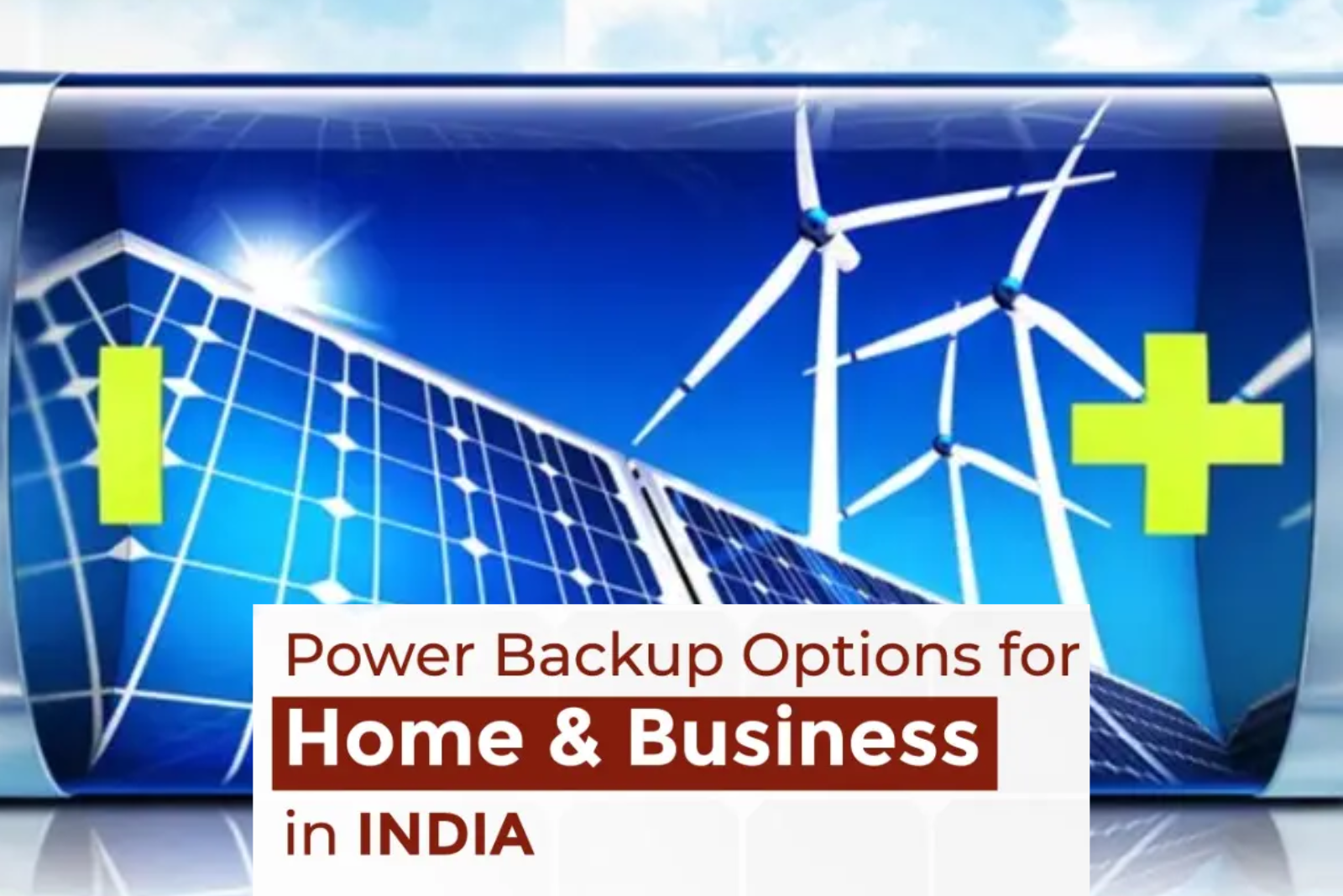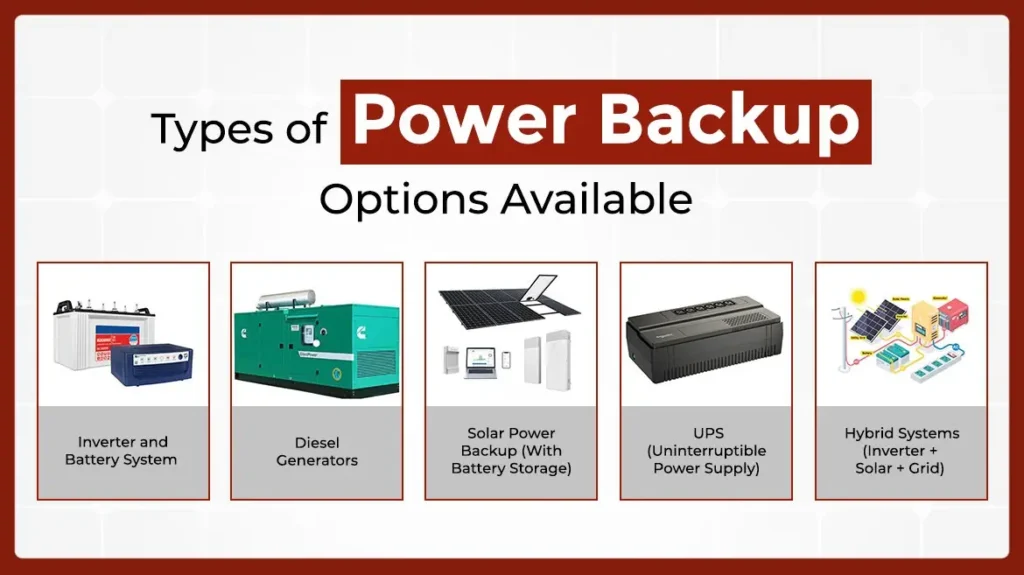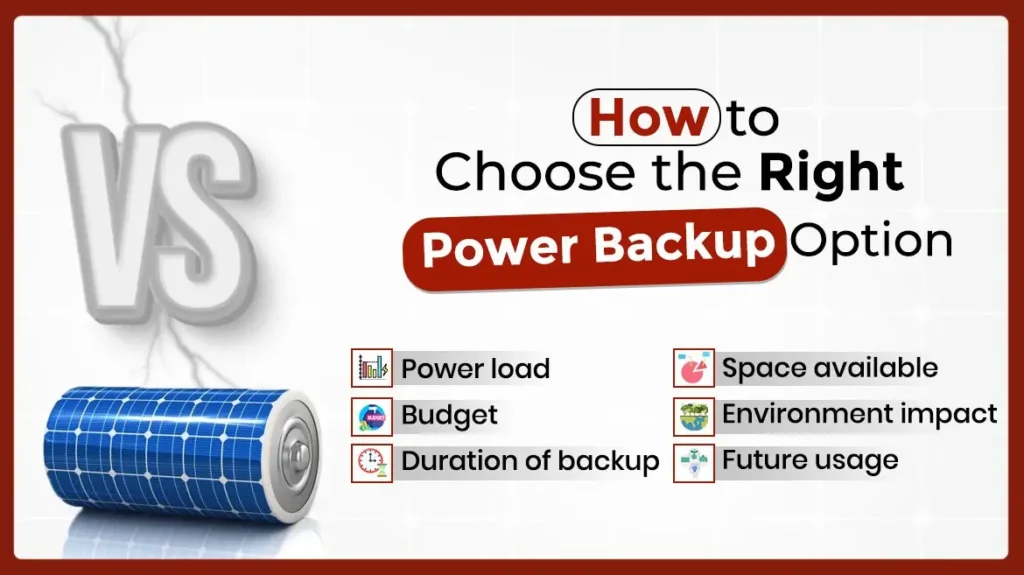Power Backup Options for Home & Business in India
- Home
- Blogs

We’ve all been there — power cuts in the middle of work, cooking, or relaxing. In a country like India where electricity supply can be unpredictable, having a reliable power backup option isn’t just smart — it’s necessary. Whether you live in a flat, run a shop, or manage an office, power backup systems help keep your day running smoothly.
This blog will walk you through the most common and useful power backup options available today, their pros and cons, and how to choose what’s right for your home or business.
Why Do You Need Power Backup at All?
Before we talk about types, let’s understand why power backup is important:
- Uninterrupted work & productivity
- Comfort during summer outages
- Safe operation of medical or security equipment
- Protection for devices from sudden shutdowns
- Peace of mind during storms or grid failures
Types of Power Backup Options Available

Here are the most commonly used power backup systems in India:
1. Inverter and Battery System (for Homes & Small Offices)
What It Is: An inverter stores power in a battery and supplies electricity during cuts.
Best For: Homes, small shops, small offices
Power Capacity: Usually supports lights, fans, TV, laptop
Pros:
Affordable
Easy to install
Low maintenance
Cons:
Doesn’t support heavy appliances like AC, fridge, etc.
Battery needs replacement every few years
2. Diesel Generators (DG Sets) – For Large Loads
What It Is: A generator that runs on diesel and supplies power instantly.
Best For: Offices, factories, events, schools
Power Capacity: Can support heavy machinery, lifts, ACs, and more
Pros:
Reliable and strong output
Runs for long hours
Cons:
Noisy and polluting
Requires diesel refilling and regular servicing
High initial and operational cost
3. Solar Power Backup (With Battery Storage)
What It Is: Solar panels generate electricity which gets stored in a battery for later use
Best For: Eco-conscious homes, remote areas, long-term savings
Power Capacity: Depends on panel size; scalable
Pros:
Green and sustainable
Low electricity bills
Government subsidies available
Cons:
High initial setup cost
Depends on sunlight availability
4. UPS (Uninterruptible Power Supply) – For Computers and Critical Devices
What It Is: A small power backup device for computers and electronics
Best For: IT rooms, server rooms, personal PCs
Power Capacity: Short-term backup (10-20 mins)
Pros:
Instant switch to battery
Prevents data loss
Cons:
Not meant for running devices long-term
Limited power capacity
5. Hybrid Systems (Inverter + Solar + Grid)
What It Is: A smart system that combines grid power, solar energy, and battery storage
Best For: Homes and businesses seeking flexibility
Pros:
Smart usage of multiple power sources
Great for areas with irregular supply
Cons:
Requires professional setup
Slightly expensive but cost-effective in the long run
How to Choose the Right Power Backup Option?

Every home or business has different needs. Here’s what to consider:
Power load: List how many devices you want to run during a cut
Budget: Don’t overspend — start with what you really need
Duration of backup: Short-term or long hours?
Space available: DG sets need open space for exhaust
Environment impact: Prefer solar if you want eco-friendly backup
Future usage: Go for scalable systems if usage may increase
Real-Life Example – What Businesses Are Doing Today
Many businesses are switching to solar + inverter hybrids for cost savings and sustainability. For example, a school in Noida recently installed a solar-powered inverter system that powers 80% of their daytime load and runs backups during cuts — saving both electricity and diesel bills.
Similarly, small offices are now replacing noisy generators with lithium battery-powered inverters, which are compact and silent.
KLK Ventures’ Role in Power Backup Solutions
At KLK Ventures Private Limited, we understand how critical power is for homes, industries, and institutions. Our DG sets, hybrid energy systems, and consulting services help you choose the most efficient solution as per your budget and requirement.
Whether you’re setting up power backup for a housing society, factory, school, or corporate office, our team offers:
- DG Set supply & installation
- AMC & Maintenance services
- Solar backup systems with inverter support
- Technical support and load analysis
Explore our services on www.klkindia.com or contact us for a customized consultation.
FAQs
Q1. What’s the best power backup option for homes?
A: Inverter and battery systems are the most affordable and easy for home use.
Q2. Can solar systems work as full power backup?
A: Yes, if combined with battery storage, solar can fully support homes and small businesses.
Q3. Are DG sets still useful?
A: Yes, for heavy usage like factories or buildings, DG sets provide strong, long-term power.
Q4. Which option is most eco-friendly?
A: Solar power is the cleanest and most sustainable backup.
Q5. What is the lifespan of an inverter battery?
A: Usually 3–5 years, depending on usage and maintenance.
Q6. How do I calculate my power backup requirement?
A: List all appliances you need during a cut and check their wattage total.
Q7. Do power backups require government approval?
A: Only for commercial DG sets or solar installations above a certain size.
Q8. Can I combine multiple power sources?
A: Yes, hybrid systems offer great flexibility by combining grid, solar, and battery.
Conclusion
Renewable energy is not just a trend — it’s the smart way forward. Whether it’s a solar panel on your roof, a windmill on a hill, or a hydro dam in a river — these clean power sources are helping build a better, greener future.
They may not be perfect yet, but they’re improving fast. With time, effort, and support, renewable energy can be the main way we power our homes, schools, and cities.
And the best part? It’s something that helps everyone — people, animals, and the planet.
